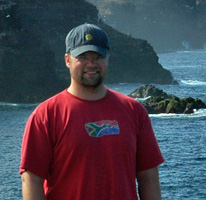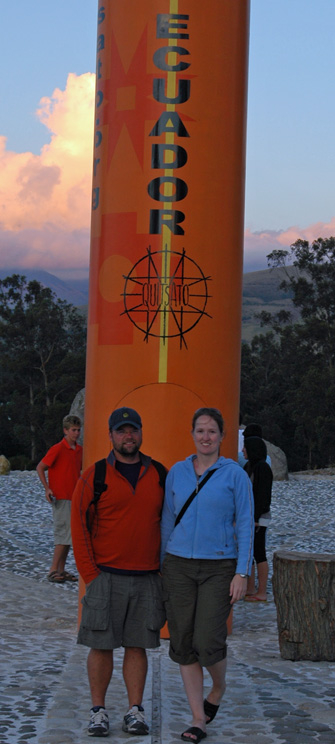AQUACULTURE STUDENT

JEFF ADAMS
What They Did Back Then
* Master of Science completed 2004, University of Guelph
Advisor: Professor Richard D. Moccia
Potential for lycopene replacement of astaxanthin pigment in the diets of rainbow trout (Oncorhynchus mykiss)
For his thesis Jeff developed methodology for the extraction & quantification of lycopene in salmonid feed & tissues; formulated, mixed & pelleted salmonids diets; performed liquid & solid-phase extraction, HPLC techniques; designed & maintained feeding trials.
ABSTRACT
Salmonids cannot synthesize carotenoids de novo, and fillet colour is one of the most important factors influencing consumer acceptance. Therefore, fish produced by aquaculture rely on carotenoid pigments being added to their diet. The addition of synthetically produced carotenoids to salmonids diets is a common and expensive practice, adding 15-20% to the total feed costs. These factors create an opportunity for potential economic savings if alternative pigment sources can be developed. Tomato farming constitutes a large agricultural industry, especially in Ontario, where tomato processors produce millions of kilograms of waste tomato skins. The major carotenoid within tomatoes is lycopene, a ruby-red pigment now known for its nutraceutical properties.
As part of these experiments, lycopene was extracted from tomato paste and incorporated into a salmonids diet. An analytical methodology for the extraction and analysis of lycopene in salmonids diets and flesh was developed using lipid, solid-phase-extraction and HPLC techniques. Feeding trials using rainbow trout were then undertaken to test efficacy uptake and retention of unmodified lycopene. No significant pigmentation or retention of either the flesh or organs was observed. Lycopene was then chemically modified to produce polar diols, in an attempt to improve the incorporation into salmonids tissues. An acid hydrolysis methodology was used to produce oxidized products of lycopene (2,6- Cyclolycopene-1,5-diol A and 2,6- Cyclolycopene-1, 5-diol B). However, this did not improve either the uptake or retention of pigment within the carcass. We speculate that the binding capacity of lycopene to actomyosin in salmonids muscle protein is low, and that lycopene in its original form may interfere with the absorption of the polar diols. It could also be possible that lycopene, and its oxidized metabolites did not survive long enough in the gut to be absorbed. A concentration dependant factor could also have existed in that 75 mg/kg of chemically modified lycopene but was not high enough to elicit a significant pigmentation result in salmonids muscle tissue. Further research should be carried out to synthesize and isolate the oxidized products of lycopene and explore the actomyosin-lycopene binding capacity of these molecules.
Where They Are Now
After graduating from Guelph, Jeff attended D'Youville College in Buffalo, New York, where he received his Teacher Certification for adolescence, Grades 7-12; his area of concentration being Science/Biology. Since 2006, Jeff has been teaching at Crescent School in Toronto permitting him to attend various Math & Science Conferences (STAO, University of Waterloo Problem Solving Conference, NMSA 2008, Carnegie-Melon Robotics Educators Conference 2008). Jeff is also the Robotics Co-ordinator and Coach for Lego Robotics in the Lower and Middle School (First Lego League and Robofest). Also, as a Smartboard Exemplary Educator, Jeff leads workshops on the use of Smartboards in the classroom.
Jeff was involved in the creation of the Grade 7 Integrated Unit for Geography and Science, for which he presented research at Brock University to Education Students (year 4/5). His presentation title, – Big Picture Planning – Thinking Across the Curriculum. Jeff is currently involved in two on-going research projects through Crescent Student Services (CSS) and Action Research Group; "The Use of Educational Robotics in the Middle School Classroom" and "How can high levels of authentic pedagogy and performance tasks help student performance?" Jeff is also involved in the Wisdom of Practice research project – "Teaching Boys – A global study of effective practices" set up by the International Boys School Coalition (IBSC)/University of Pennsylvania.
During the summer, Jeff's passion for education takes him abroad, as he teaches Grade 11/12 Biology in Ecuador: Quito, Tena (Rainforest), Galapagos Islands, Otovalo. Jeff has been a board member of Guelph International Resource Centre since 2005 (member of Strategic Planning, Water Harvesting & Old Growth Forest committees), where he currently holds the position of treasurer. All this and Jeff still finds time to coach squash and rugby at the junior level.
Travels to Ecuador
